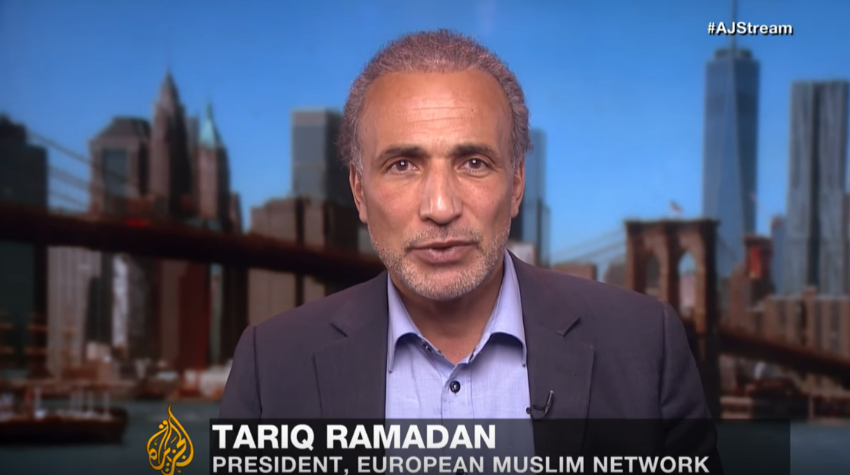Granada is hosting an edition of the Hay Festival this week. This event started out as a modest book festival in the Welsh town of Hay on Wye in 1988, but has since developed into a major itinerant international cultural event. This year’s Granada version includes talks by some distinguished spokesmen for the Arab/Muslim cause, so Maureen and I went down to hear what they had to say.
The first speaker was the Palestinian poet, Mourid Barghouti, a native of Ramallah. Today Barghouti is a tall, impeccably-dressed, white-haired elder poet/statesman, an eloquent spokesman for the Palestinian cause. He was a young man finishing an English literature degree in Cairo when the 1967 Six Day War broke out. Unable to return to his homeland Barghouti spent the next 30 years in a cruel exile which began in Egypt. But on the occasion of Anwar Sadat’s historic visit to Israel in 1977, Barghouti was deported and separated from his wife (the novelist and university professor, Radwa Ashour) and only child for the better part of 17 years. During this time he lived mainly in Budapest, where he was Palestinian cultural attaché and PLO representative in the World Federation of Democratic Youth.
Here in Granada, besides reciting poems and reading an excerpt from his 1997 book, I Saw Ramallah, an award-winning account of his return to his home after 30 years, Barghouti sympathetically expressed the plight of his countrymen in Israel, stripped of everything by a regime which insists that “Palestine does not exist.”
As well as publishing 12 books of poetry over the past 40 years, Barghouti writes on the subject in both English and Arabic. One of his most-quoted paragraphs is this one, a formula for resisting the onslaught of the fourth-most-powerful army in the world with poetry:
One of its charming miracles is that through its form, poetry can resist the content of authoritarian discourse. By resorting to understatement , concrete and physical language, a poet contends against abstraction, generalization, hyperbole and the heroic language of hot-headed generals and bogus lovers alike….Poetry remains one of the astonishing forms in our hands to resist obscurantism and silence. And since we cannot wash the polluted words of hatred the same way we wash greasy dishes with soap and hot water, we the poets of the world, continue to write our poems to restore the respect of meaning and to give meaning to our existence.” (Originally published in New Internationalist # 359 -August 2003)
At the conclusion of Barghouti’s talk we took the brief-but-inspiring Granada-spring-evening walk down the hill to hear Tariq Ramadan speak at the Auditorium Manuel de Falla. At 45, Ramadan is at the top of his game. Tall and lithe, well spoken and convincing in several languages, he is the grandson of Hassan al Banna, the Sufi schoolteacher who in 1928 founded the Muslim Brotherhood in Egypt, the world’s largest and most influential Islamist political group. His father, also a prominent figure in the Muslim Brotherhood, was expelled by Gamal Abdul Nasser from Egypt to Switzerland, where Tariq was born. He took his degree in philosophy, literature and social sciences at the University of Geneva, then studied philosophy and French literature at the masters level, and Arabic and Islamic studies for his PhD. His dissertation was on Friedrich Nietzsche. Today is in on the faculty of schools in several European countries, and an advisor to governments at the highest levels. His brilliant career has suffered only one setback, and that by default. In February 2004, he accepted the tenured position of Luce professor of religion at the Joan B. Kroc Institute for International Peace Studies, at the University of Notre Dame in South Bend, Indiana. With his work permit approved he moved there with his family. Then, in late July 2004, his visa was revoked by the State Department, under the terms of the Patriot Act, and he was forced to resign the position. Ramadan later commented on this black comedy of errors on his website in an article entitled My Reasons for Resigning My Position at the University of Notre Dame.
After Ramadan’s talk was over I bumped into my friend Victoriano in the vestibule, and I remarked to him, “It seems astonishing to me that the U.S. should expel a man of this stature. They’re making the same mistake they made with Bertrand Russell in 1943. Don’t they ever learn? He’s not a bomber, after all.” Victoriano, who is a little older and a lot wiser than I am, replied, “No, he’s something much more dangerous to the Americans than a bomber. He’s a teacher.”
source : http://mikebooth.wordpress.com/2008/04/04/banned-arab-intellectuals-speak-out-in-granada/



![PALEXPO : Democratic Engagement & Justice for Palestinians [08/07/2017]](https://tariqramadan.com/english/wp-content/uploads/sites/9/2017/07/Palexpo.png)
![Bristol Festival of Ideas : Conversation with Julian Baggini [24/05/2017]](https://tariqramadan.com/english/wp-content/uploads/sites/9/2017/06/bristol.png)
![Interview on BBC Radio Ulster [06/06/2017]](https://tariqramadan.com/english/wp-content/uploads/sites/9/2017/06/p03nnqlv.jpg)
![Interview on BBC 4 : What do the London attacks have to do with Islam? What is the Muslims’ responsibility?[06/06/2017]](https://tariqramadan.com/english/wp-content/uploads/sites/9/2017/06/bbc.jpg)


Tres belle conclusion !!! je reste convaincu qu’il n’y a que du bien dans ce refus de visa !!! take care,
soraya